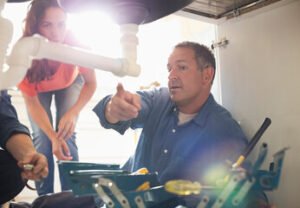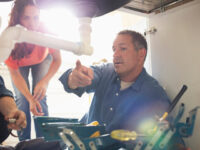Exploring the Work Life of a Skilled Plumber
Plumbing is a vital service that separates clean water from waste, keeping us safe and comfortable in our homes. It’s a trade that is often misunderstood and undervalued, but one that has the potential to change that.
Plumbers are most visible when they show up to fix burst pipes and leaky showers, but their job is more varied than that. They work in construction, consulting blueprints and installing piping systems and fixtures. Contact Plumbers Bradenton for professional help.
If you love working with your hands and would rather be on the road than in an office, a career as a plumber may be perfect for you. This trade is a highly respected one that offers stability, variety, and excellent earning potential. You also get the satisfaction of knowing your work directly affects people’s daily lives. Plumbing ensures that homes and businesses have clean water and functioning waste systems, which are essential to health and safety.
To be a successful plumber, you will need a variety of technical skills. These include pipe installation and repair, knowledge of water supply, drainage, and sewage, and fixture installation. You will also need to be able to read and interpret blueprints in order to install the correct parts for each job. The ability to troubleshoot and solve problems quickly is a vital skill for plumbers, as many of the calls they receive are emergency situations that require immediate attention.
Being a plumber can be physically demanding, so you need to be in good shape. The job requires you to lift and move heavy objects, as well as work in confined spaces, often in tight or awkward positions. You will also need to be comfortable using power tools and working with chemicals.
Plumbing is a fast-growing industry, and there are several opportunities for advancement. Plumbers can choose to specialize in residential or commercial, and they can also advance to become field or operations managers. Many plumbers also start their own companies, which gives them more control over their schedule and income.
One of the best aspects of being a plumber is that it can be a family-friendly career. However, it’s important to remember that this is a skilled trade that requires training and certification. If you’re interested in becoming a plumber, consider signing up for an apprenticeship program at a local vocational school or community college. These programs offer on-the-job training and classroom instruction, allowing you to gain valuable experience while learning the trade. Many apprenticeships also provide health insurance and other benefits. Moreover, these programs are less expensive than attending college and may help you avoid hefty tuition fees.
Education
The educational requirements to be a plumber vary, depending on the specialty and what area of plumbing you want to work in. Some people choose to get their education through a vocational school, while others start with an apprenticeship. A high school diploma or GED certificate is generally enough to begin an apprenticeship, but to advance to the level of master plumber, a postsecondary education is required.
Trade schools or vocational schools offer classroom-based training that covers basic plumbing concepts and techniques. This type of training often includes hands-on practical sessions and interactive discussions to help you learn the skills necessary for the job. Some programs also include instruction in math for plumbers, so you’ll be prepared to handle the technical drawings and plumbing codes that you’ll encounter on the job.
Continuing your education through an online course is another option. There are plenty of reputable online colleges and universities that offer courses on plumbing. You can find many of these courses through a simple search, but it’s important to select an accredited program that offers a broad spectrum of topics related to the field. Some courses will cover introductory concepts, such as plumbing fundamentals and how to use hand tools safely. Others will provide more in-depth coverage of specific aspects of the field, such as piping materials and their installation, as well as plumbing repairs and basic installations.
If you want to work as a residential journeyman plumber, you must complete an apprenticeship program and pass an exam. To become a master plumber, you’ll need at least two years of experience as a journeyman plumber and must pass a more comprehensive exam that tests your knowledge of specialized plumbing systems.
In addition to formal education, many experienced plumbers learn on the job and through self-study by reading books or manuals. They may also join professional organizations like the American Society of Plumbing Engineers or the Plumbing-Heating-Cooling Contractors Association to network with peers and stay up to date on industry news and updates. There are also online learning platforms that offer a more socialized experience and allow you to interact with other students and experts from around the world.
Experience
Plumbers must have a mix of technical knowledge and practical skills to do their job well. They must have the physical stamina to work in tight spaces and the dexterity to handle tools, but they also need good communication and problem-solving abilities to interact with clients and recommend suitable solutions for their individual needs.
Plumbing is a hands-on career that can give you a real sense of accomplishment and satisfaction in what you do. It’s a flexible career choice, allowing you to work for yourself or a company, and you can choose to specialise in areas like gas, hot water or heating systems.
Unlike some other skilled trades, you don’t need years of schooling or a huge student loan to become a plumber. You can learn the skills through on-the-job training or by studying a vocational course at a trade college.
A plumber’s work can take them in a variety of places, from domestic properties for private clients to commercial and industrial settings. If you are a service plumber, your work will focus on responding to calls about plumbing problems like leaky taps and blocked drains. This type of plumbing can be very satisfying because it helps people in times of need.
If you are a maintenance plumber, your job will involve installing and maintaining plumbing systems in larger buildings such as office blocks, hospitals and power plants. These systems can be more complex, and they may need to be installed in conjunction with other building services such as air conditioning and fire sprinklers.
You can also find plumbers working on construction sites, where their responsibilities are to install plumbing according to the building plans and specifications. This can include laying out piping, connecting appliances and fixtures, and testing the system to make sure it’s working correctly.
You may also be required to work with hazardous materials, such as asbestos, in some plumbing jobs. If this is the case, you will need to undertake an Asbestos Awareness Course before starting your work. This will teach you how to identify and avoid asbestos-containing materials, as well as the health and safety procedures you should follow when working with them.
Licenses
A plumbing license is a requirement in many states to engage in the practice of the trade. Typically, a plumber must pass an exam to be licensed to install, replace, repair, or maintain plumbing systems in residential and commercial structures. Some plumbers pursue licensure to enhance their career opportunities and open the door to higher pay. Others need their license to satisfy job requirements, such as when working with hazardous materials.
In the field, a plumbing technician can expect to work on projects that require them to inspect, install, and repair water heaters, faucets, toilets, tubs, showers, water and gas lines, and other plumbing fixtures. They also need to understand codes and regulations to ensure that their installations comply with local, state, and federal standards. Plumbers often interpret blueprints and plans to determine the best way to install and connect plumbing components.
Plumbing is a hands-on trade that involves heavy lifting and working in cramped spaces. It is important for plumbing technicians to be physically fit and prepared for the demands of this profession. It is also important to have good communication skills to effectively communicate with clients and coworkers.
To become a licensed plumber, an individual must complete an apprenticeship program or obtain a journeyman license by submitting proof of experience and passing an exam. Apprenticeship programs may be offered by vocational schools or through local unions. Journeyman plumbers must also complete a certain number of hours of continuing education to keep their licenses valid.
Once licensed, plumbers can choose to work as independent contractors or join large firms. Plumbers who are self-employed can enjoy greater flexibility in their schedules and the option to choose which jobs they want to take. They can also benefit from the freedom of being able to set their own prices.
Plumbers can make a positive impact on the health and safety of their communities. Their work helps to ensure that people have access to clean water and functioning waste systems, which are vital for human survival. Plumbers can also feel satisfaction in knowing that they have helped people in times of need, such as when a pipe bursts or an emergency toilet is clogged.






